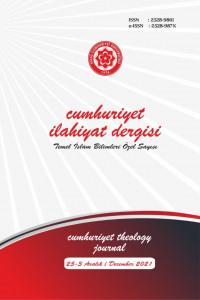Ya‘kûb el-Hadramî Kıraatini Diğer Kıraatlerden Ayıran Özellikler
Features Distinguishing Ya‘qūb al-Hadrami Recitation from Other Recitations
Author(s): Mustafa HamurlıSubject(s): Aesthetics, Islam studies, Philosophy of Religion, Qur’anic studies
Published by: Cumhuriyet Üniversitesi İlahyat Fakültesi
Keywords: Tafsīr; Qurʾān; Recitation; Sūrah; Yaʿqūb;
Summary/Abstract: It is known that the science of recitation is one of the important branches of Islamic sciences in terms of its subject. It is stated that the science of recitation is intertwined with the Qurʾān and has an important place in terms of tafsīr, ḥadīth and law sciences. In this respect, it is understood that the recitation of Yaʿqūbis one of the ten sound recitations accepted as authentic and mutawātir (Consecutive). Although there are comparative works in whichYaʿqūb's recitation is mentioned together with other recitations, it is striking that there is no study in whichYaʿqūb's recitation is handled separately. In this study, it is aimed to clarify the issues in Yaʿqūb’s recitation, even though they are not in other recitations. It is understood that Yaʿqūb’s recitation has some differences compared to other recitations and contains some unique features. In this respect, these issues specific to Yaʿqūb reading are frequently encountered in dictionaries and tafsīr sources. In this article, it is planned to evaluate the recitation of Yaʿqūb in two parts. In the first chapter, the procedural rules of Yaʿqūb recitation are given and the subjects are explained with the sampling method. In the second part, attention is drawn to the points where Yaʿqūb recitation differs from other recitations. What is meant by the rules of procedure in the science of recitation is the set of general rules that take place when conditions such as madd, qasr, izhār, idghām and iqlāb are met. Farsh, recitation on the other hand, is the different reading of certain words independent of these rules. There are different views on the reading of the pronoun hā, which is evaluated within the framework of the rules of procedure. Recitation imams state that it is controversial whether the pronoun hā in the dual and plural pronouns which comes after the silent letter, can be read with damma (u sound) or kasrah (i sound). When the recitation of Ya'qūb is examined, it is understood that all pronouns of this type are read with damma and this view is preferred. It is stated that there is no consensus on the use of the letter mīm, which is a sign of plurality with kasrah or damma. In this regard, Ya'qūb subordinates the letter mīm to the letter hā, Where the letter hā is pronounced damma, it reads the letter mīm as damma, and where the letter hā is pronounced as damma, it reads the letter mīm with kasrah and does not go beyond this limit. Idghām, which is used as a concept in the science of recitation, is the combination of two letters that are mutamasil, mutaqārib or mutajānis, transforming them into a single letter and forming it. It is stated that Abu 'Amr was the imam of the recitation, who practiced İdghām-ı kabir, which is one of the important subjects of the science of recitation and tajwīd (the rules of recitation), and that Ya'kūb came later. It is seen that some recitation imams on the subject of waqf (stopping) did not make any changes regarding the words dedicated on it, by complying with the way it was written in the musḥaf (the Qur’ān) . However, it is striking that there are some changes in the recitation of Ya'qūb. As a concept used in the science of recitation, farsh is the reading of the words in the Qur'ān in different ways by the recitation imams and attributing each recitation to its owner. Therefore, these differences take place in all recitations and this subject is also known as Farshu'l-Khurūf or alFurū'. When we look at the difference between farsh and usūl in the science of recitation, it is seen that the usūl is realized within the framework of certain rules, while the farsh is formed independently of these rules.
Journal: Cumhuriyet İlahiyat Dergisi
- Issue Year: 25/2021
- Issue No: 3
- Page Range: 1163-1180
- Page Count: 18
- Language: Turkish

